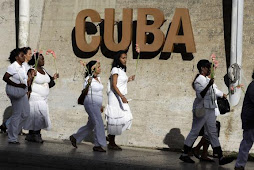Settling U.S. business, property claims against Cuba poses challenges
BY MARTHA BRANNIGAN MBRANNIGAN@MIAMIHERALD.COM
12/19/2014 7:33 PM 12/19/2014 7:33 PM
If the devil is in the details, one hellish issue along the road to
normalizing relations between the U.S. and Cuba will be finding a way
forward to settle claims by U.S. companies and individuals who lost
property in the Cuban revolution more than half a century ago.
After Fidel Castro swept down from the mountains to seize control of the
island, the new government, mostly between 1959 and 1961, expropriated
the lion's share of U.S. corporate and personal assets there. That
included some two million acres of land, such as sugar fields, plus
factories, utility companies, mining operations and docks.
U.S. nationals have about $7 billion in certified claims against the
Cuban government, based on proceedings by the Foreign Claims Settlement
Commission of the United States, a unit of the Justice Department that
is authorized to sort out such matters. The process did not cover
properties owned by Cubans who moved to the United States or who still
live on the island.
Claimants include Exxon Corp., Texaco, Coca-Cola Co. and
Colgate-Palmolive Co., among a host of other U.S. blue chip companies,
but they also include many individuals with small grievances, down to
the loss of a bicycle.
"It's going to be quite an involved process to find a way to settle
these claims, because Cuba doesn't have $7 billion," said Mauricio
Tamargo, a partner at the law firm Poblete Tamargo LLP, who chaired the
Foreign Claims Settlement Commission from 2002 to 2010 and more recently
began representing some big claimants. "There is going to have to be
some creative thinking to settle this debt.''
Many claimants have died. In the case of companies, some have been
acquired or merged into other entities.
After the revolution the U.S. froze Cuban funds in U.S. banks but over
the years legal cases won by default because the Cuban government chose
not to defend itself in U.S. courts have eaten away at the total.
Meanwhile, the Cuban government has counterclaims against the U.S. for
economic damage resulting from the long-running embargo.
Experts agree that if the Obama Administration's push to restore
diplomatic ties is to evolve into an eventual end to the embargo, the
claims issue will surely be a part of that process.
The Helms-Burton Act, which lays out terms of the embargo, mandates that
such claims must be resolved as an essential condition to resuming full
economic and diplomatic relations.
But it remains to be seen how and when the two governments will broach
that issue in the wake of the historic moves this week.
"Before we would get to the kind of relations we have with, say, China,
the claims issue will have to be dealt with one way or another," said
Patrick J. Borchers, director and professor of law at the Werner
Institute at Creighton University in Omaha, Neb., who led a 2007 study
on Cuban claims.
Roberta Jacobson, U.S. assistant secretary of state for western
hemisphere affairs, referred in passing to the claims issue in a
briefing with reporters Thursday. She said the issue would have to be
addressed, but suggested the timing would likely be after diplomatic
ties are resumed.
In sketching out the process ahead, Jacobson said representatives of the
two governments will begin soon to work out details so that the U.S. can
transition to having an embassy on the island.
"But there are other things that need to be agreed upon that have always
been part of the discussion of diplomatic relations with Cuba, such as
registered claims against the Cuban government," Jacobson said. She
added: "We do not believe those things would be resolved before
diplomatic relations would be restored, but we do believe that they
would be part of the conversation."
The Foreign Claims Settlement Commission, established in 1964, has
certified 5,913 claims, according to Timothy Ashby, a Florida attorney
now based in London who also has worked extensively on the issue. The
commission completed its initial process in 1972, then added two
additional claims in 2005.
The claims originally amounted to $1.7 billion, but soared in value to
about $7 billion based on 6 percent simple interest per year.
Cuba has already settled claims with a variety of countries, such as
Spain, Canada, France and Switzerland, concerning expropriation of assets.
Over the years, a variety of ideas have been put forth on how to settle
the massive dispute with U.S. firms and citizens.
In 2006, Ashby, who was then based in Miami, helped create a company
that set out to acquire certified claims at a discount with the goal of
swapping the debt for equity. Ashby said the Cuban government "was
willing to do equity and other joint ventures," in exchange for
satisfying debt.
But the effort, he said, was thwarted by the President George W. Bush's
administration, which said the process required a license from the
Treasury Department's Office of Foreign Assets Control, which was never
issued.
"It was Catch 22," Ashby said. "They shut us down by setting a licensing
requirement, and the company went dormant.''
Borchers, the Creighton law professor, said among the options for
settling claims would be providing the claimants with economic
opportunities on the island, such as development rights or tax-free
zones in lieu of cash.
"The big practical problem is Cuba certainly does not have hard currency
to pay any substantive portion of these claims," Borchers said.
Promoting economic development, he said, "would help lift the Cuban
economy and help Cuban people."
Source: Settling U.S. business, property claims against Cuba poses
challenges | The Miami Herald -
http://www.miamiherald.com/news/nation-world/world/americas/cuba/article4701645.html
Subscribe to:
Post Comments (Atom)





No comments:
Post a Comment